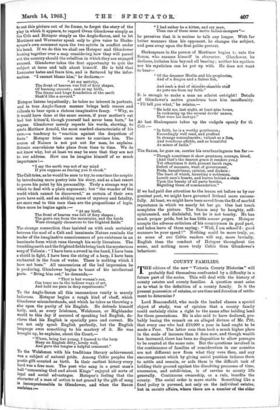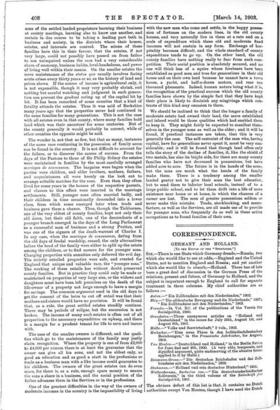COUNTY FAMILIES.
THE editors of the new "Victoria County Histories" will probably find themselves confronted by a difficulty in a future part of the series. This will deal with the history of county estates and county families. A question must arise as to what is the definition of a county family. Is it the present possession of estates, or are time and duration of settle- ment to determine ?
Lord Beaconsfield, who made the landed classes a special object of study, was of opinion that a county family could certainly claim a right to the name after holding land for three generations. He is also said to have declared, pro- bably basing the remark on an alleged dictum of Mr. Pitt, that every one who had 210,000 a year in land ought to be made a Peer. The latter sum then took a much higher place in the scale of incomes than it does now, and though wealth has increased, there has been no disposition to allow peerages to be created at the same rate. But the questions involved in the continuance of families of consideration in our counties are not different now from what they were then, and any encouragement which by giving social position induces them to settle and remain, or aids them in the difficult task of holding their ground against the dissolving processes of time, succession, and subdivision, is of service to county life generally. Continuous ownership, as a rule, benefits the county. The social order is more stable- Something like a fixed policy is pursued, not only on the individual estates, but in county affairs, where there are a number of the elder
sons of the settled landed proprietors learning their business at county meetings, learning also to know one another, and certain in due course to be taking a leading part both in business and society, in the districts where their homes, estates, and interests are centred. The scions of these families have this in their favour, that the estates, if not very large, could not possibly have passed on from father to son unimpaired unless the race had a very considerable share of economy, business habits, level-headedness, and power of living well within their means. On the smaller estates the mere maintenance of the status quo usually involves facing acute crises every thirty yea's or so, as the history of land and prices shows. If the source of income is agricultural only, it is not expansible, though it may very probably shrink, and nothing but careful watching and judgment in each genera- tion can prevent the gradual eating up of the capital bit by bit. It has been remarked of some counties that a kind of fatality attends the estates. Thus it was said of Berkshire many years ago that the properties never had continued in the same families for many generations. This is not the case with all estates even in that county, where many families hold land which was their ancestors' for some centuries. But of the county generally it would probably be correct, while of other counties the opposite might be said.
The wonder is, not that so few, but that so many, instances of the same race continuing in the possession of family acres can be found in the country. It is not difficult to account for the failure, or to discover the causes of success. From the days of the Pastons to those of Sir Philip Sidney the estates were maintained in families by the most carefully arranged manages de con vertance. The bargains were begun when the parties were children, and elder brothers, mothers, fathers, and acquaintances all were keenly on the look out to arrange suitable matches for the sons. Even then they often lived for some years in the houses of the respective parents, and clauses to this effect were inserted in the marriage settlements. Still, younger sons often married badly, and their children in time occasionally descended into a lower class, from which some emerged later when trade and business gave them a chance. Thus, though the Tichbornes, one of the very oldest of county families, kept not only their old dcres, but their old faith, one of the descendants of a younger branch emerged in the days of the Long Parliament as a successful man of business and a strong Puritan, and was one of the signers of the death-warrant of Charles I. In any case, when the mariag es de convenance, dating from the old days of feudal wardship, ceased, the only alternatives before the head of the family were either to split up the estate among the children, or to find careers for the younger sons. Charging properties with annuities only deferred the evil day. The strictly entailed properties were safe, and created for England that unique and valuable race, the "younger sons." The working of these entails has without doubt preserved county families. But in practice they could only be made or maintained on properties of very large size, or the widows and daughters must have been left penniless on the death of the life-owner of a property not large enough to leave a margin for savings. The common argument used in the old days to get the consent of the heirs to cut off entail was that their mothers and sisters would, have no provision. It will be found that, as a rule, the great settled estates steadily continue. There may be periods of eclipse, but the succession is not broken. The income of many such estates is often out of all proportion to the necessary expenditure on upkeep, and there is a margin for a prudent tenant for life to save and insure with.
The case of the smaller owners is different, and the quali- ties which go to the maintenance of the family may justly claim recognition. Where the property is one of from e2,000 to 24,000 per annum there is at least the guarantee that the owner can give all his sons, and not the eldest only, as good an education and as good a start in the professions or trade as a business man with a like income could guarantee to his children. The owners of the great estates can do even more, for there is, as a rule, enough spare money to ensure the sons a share in a business, and the social position of the father advances them in the Services or in the professions.
One of the greatest difficulties in the way of the owners of moderate incomes in the country is the impossibility of living
with the new men who come and settle, in the happy posses- sion of fortunes on the modern lines, in the old county houses, and very naturally live in them at a rate and on a scale of expenditure which these old and moderate fixed incomes will not sustain in any form. Exchange of hos- pitality becomes difficult, and the whole standard of county expenditure tends to go up. On the other hand, the old county families have nothing really to fear from such com- petition. Their social position is absolutely secured, and no one will think less of a squire whose forebears have been established as good men and true for generations in their old house and on their own land because he cannot have a towa house, a yacht, and half-a-dozen motors, and rear ten thousand pheasants. Indeed, human nature being what it is, the recognition of the practical success which the old county families have shown by the simple fact that they have kept their place is likely to diminish any misgivings which con- traste of this kind may occasion to them.
We should be inclined to think that the longer a family of moderate estate had owned their land, the more established and inbred would be those qualities which had enabled them to keep it. They might fairly be expected to manifest them- selves in the younger sons as well as the elder ; and it will be found, if practical instances are taken, that this is very generally the case. The self-restraint of the men who, having capital, have for generations never spent it, must be very con- siderable; and it will be found that though land often only tells the story of the decline of families, it, like the shield of two metals, has also its bright side, for there are many county families who have not decreased in possessions, but have added acre to acre. The future is in the hands of the sons; but the sons are much what the beads of the family make them. There is a tendency among the smaller landed gentry not to give their sons the best educatior, but to send them to inferior local schools, instead of to a large public school, and to let them drift into a life of mere existence near home or at home, in which the chances of a career are lost. The men of greater possessions seldom or never make this mistake. Trade, stockbroking, and manu- facture, as well as the Services, are all made use of to provide for younger sons, who frequently do so well in these active occupations as to found families of their own.











































 Previous page
Previous page